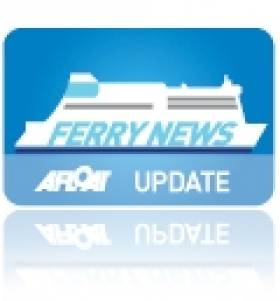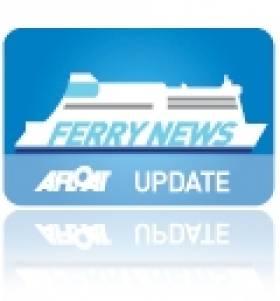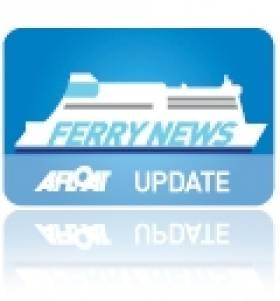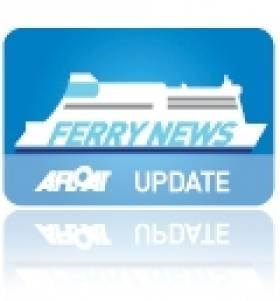Displaying items by tag: Cartour Beta
New Vessel on the Horizon for Celtic Link Ferries
With an increased capacity of nearly 1,000 passengers accommodated in 428 cabin berths, the vessel will offer a wider choice of bars, restaurents and childrens' play area compared to the current route ro-pax Norman Voyager, which like her successor was built by Italian shipbuilders Visentini. The 25-knot replacement ship will have 2,285 lane metre space for 800 cars or 150 freight vehicles.
Celtic Horizon becomes the first vessel to incorporate the companies name since foundation in 2005 when the freight-ferry Diplomat started operations. In recent years the company has secured the contract to import new trade vehicles from French manufacturers.
Before the newcomer makes her Autumnal debut, the 2006 built vessel is currently operating as Cartour Beta while on charter to Caronte and Tourist's (C&T) Salerno-Messina service in Sicily. To read more click here.
As for the Norman Voyager, she first entered as a newbuild in 2008 for LD Lines weekend operated Rosslare-Le Havre route, subsequently transferred to Cherbourg. LD Lines first foray into the Irish market was short-lived as the ro-pax was sub-chartered to Celtic Link Ferries the following year, though the French company are to transfer the vessel to their Marseilles-Tunis route in November.
- Diplomat
- Celtic Link Ferries
- Ports and Shipping
- RosslareCherbourg
- Norman Voyager
- Visentini
- RoPax
- FreightFerry
- Ferry news
- LD Lines
- Cartour Beta
- Caronte and Tourist
- Visentini ropax
- RosslareLe Havre
- SalernoMessina
- MarseillesTunis
- Irish ferry market
- IrishFrench ferry services
- Irish ferry sector
- Irish Ferries
- RoPax Norman Voyager
- Rosslare Port
- Rosslare Europort
- French trade vehicles
- Citreon
- Peugoet
- Renault
Celtic Link Ferries First Ferry Goes to the Breakers
Launched as the Stena Tranporter, the career of the 16,000 tonnes has spanned over three decades in which the 151m vessel changed through several owners and subsequent vessel renamings.
It was when she served under the name Baltic Ferry, that her most notable career took place in 1982 during her wartime deployment as part of the
Falklands Islands Task Force. The 151m vessel was requisitioned by the British Ministry of Defence which saw the ship engaged in military operations when RAF Harrier Jump-Jet aircraft transferred store supplies from the deck of the ship as part of the war-effort in the South Atlantic Ocean.
In 2001 the vessel undertook ferry operations to Ireland as the European Diplomat on the Dublin-Liverpool route for the P&O (Irish Sea) route network. The following year she was transferred on the direct route to France until P&O pulled the plug on the continental service in December 2004, leaving Irish Ferries as the sole operator.
It was not until February 2005 that the route resumed service but this time under new owners Celtic Link Ferries. The O'Flaherty brothers, owners of a large fishing fleet in Kilmore Quay purchased the vessel and renamed her Diplomat. See PHOTO.
For the next four years she built up a steady customer loyalty between freight-hauliers drivers and car-only accompanying passengers who were accommodated in the ship which had a limited passenger certificate for 114 passengers. In addition she had a license to transport livestock.
Currently Celtic Link Ferries operate the ferry Norman Voyager but the 800-passenger / 200-car ro-pax vessel will only remain on the route until an October debut of a larger sistership the Cartour Beta.
The vessel is running this season between Italy and Sicily and with an added deck the 27,552 tonnes vessel has an increased capacity for passengers, cars and enhanced range of facilities. Recently the company had run a competition to name the new vessel which is to begin a five-year charter on the service between Wexford and Normandy.
- Wexford
- irish sea
- Diplomat
- Celtic Link Ferries
- Kilmore Quay
- Stena Rederi
- Marine Express
- RosslareCherbourg
- Norman Voyager
- Ports and Shipping News
- Normandy
- RoPax
- DublinLiverpool
- P&O (Irish Sea)
- Ferry news
- Cartour Beta
- Irish Sea Ferries
- Stena Transporter
- Baltic Ferry
- European Diplomat
- O'Flaherty Brothers
- Falklands Islands Task Force
- Hyundai Heavy Industries
- Freighthauliers
- Livestock
- RAF
- Harrier JumpJets
Countdown to Name New Celtic Link 'Ferry'
With the entry of the new ferry, the Wexford based company are asking the public to come up with a name that is relevant to both the French and Irish market.
Competition entrants will be in a chance to win a prize, for you and your family to sail at the time of your choice (subject to availability) on the ferry you have named. The prize includes cabins both ways and your vehicle. For further details on how to enter the competition go to www.celticlinkferries.com
To read more about the new 27,500 tonnes vessel which is slightly larger to the current route vessel Norman Voyager click here. The new ship has a speed of 25 knots, an increased passenger capacity of nearly 1,000 passengers, 800 cars or 150 freight vehicles.
Celtic Link Ferries Look Forward to New Ferry
Celtic Link Ferries are to introduce a replacement ferry on their Rosslare-Cherbourg port route later this year, writes Jehan Ashmore.
The current ship serving the route to France is a modern 26,500 tonnes ro-pax ferry Norman Voyager which entered service for Celtic Link Ferries less than two years ago. The ferry (photo) has a service speed of 22.9 knots and takes 18-hours to travel on the direct route between Ireland and France.
A spokesperson for the company claimed that bookings for the thrice-weekly round-trip sailings for this season are faster in uptake compared to this time last year. The Norman Voyager can take 800-passengers and 200 vehicles and facilities include 110 cabins, bar, restaurant, lounges, cinema and a shop.
The charter of Norman Voyager ceases in October and this will see the introduction of the acquired vessel on the year-round operated service. A competition is to be run and open to the public so to establish a new name for the vessel.
The new vessel the Cartour Beta (photo) is slightly larger at 27,552 tonnes and will be able to offer facilities with a wider choice of bars, restaurents and play areas. She has a speed of 25 knots, an increased passenger capacity of nearly 1,000 passengers, 800 cars or 150 freight vehicles.
Cartour Beta in the meantime operates on an Italian ferry service run by Caronte and Tourist (C&T) on two routes between Salerno to Messina and Termini Imerese in Sicily.
Externally in appearance the vessels are very similar except that the Cartour Beta has a continues superstructure that extends to surround the funnel whereas on the Norman Voyager this area is occupied by an open upper vehicle deck.
In fact the replacement vessel is more alike to Stena Line Irish Sea Ferries Belfast-Birkenhead route-ship sisters Lagan Viking and Mersey Viking. Like the Norman Voyager all these vessels are derived from a popular series built by Visentini, an Italian shipyard in Donada near Venice.
Since Celtic Link Ferries took over the route from P&O Irish Sea in 2005, the company has kept to a keenly priced policy with competition from other operators on the continental routes that also run out of Rosslare Harbour and from Cork.



























































